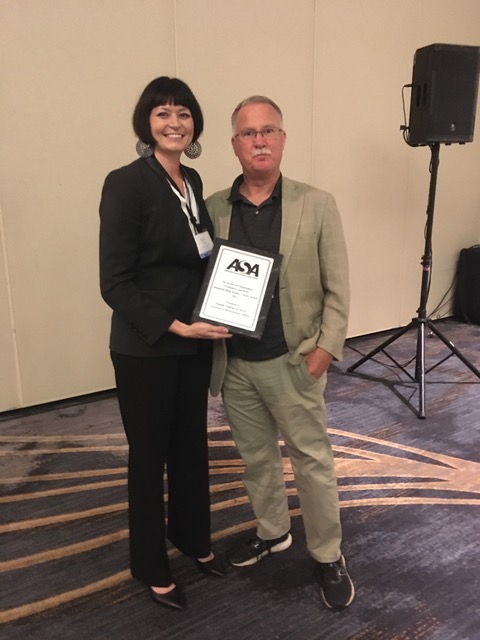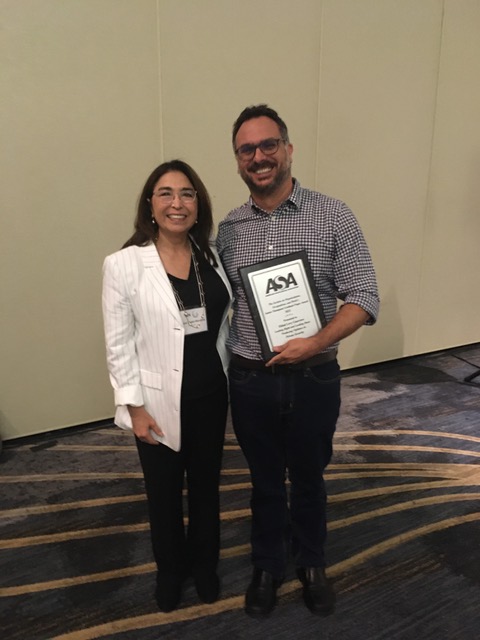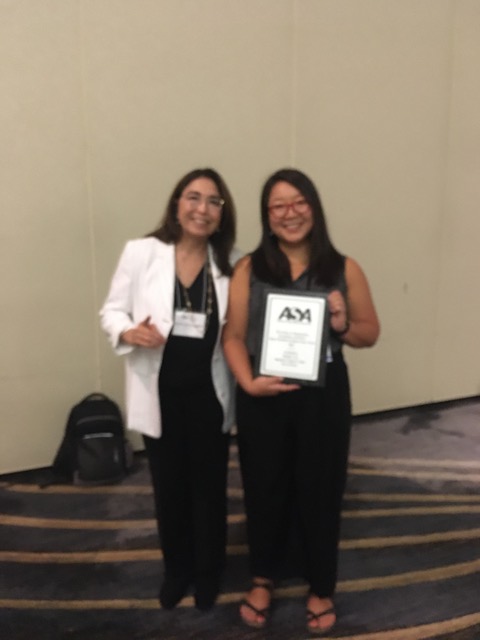Dear OOW members,
As usual, reading the nominees for OOW awards is a reminder of what important and innovative research our members are conducting. This year was no exception, with large and strong pools to consider in each of our award categories. Below you will find a description of this year’s winners of the Max Weber Book Award, the Richard Scott Article Award, the James D. Thompson Graduate Student Paper Award, and the Rosabeth Moss Kanter Career Award. My sincere thanks to committee chairs Elaine Draper, Erin Cech, Vinnie Roscigno, and Amy Binder for their service to the section, and to all members of the committees for their time and engagement. I hope you find this work as exciting as I do, and that this whets your appetite to read it more deeply!
Best wishes,
Beth Popp Berman
Max Weber Book Award
Co-winners:
Margaret M. Chin. 2020 Stuck: Why Asian Americans Don’t Reach the Top of the Corporate Ladder. NYU Press.
Margaret Chin’s Stuck provides a compelling window onto corporate America, examining the powerful, yet often invisible, barriers in the workplace that prevent second-generation Asian Americans from achieving the highest level of corporate leadership. The 103 interviewees we meet in the book fit the “model minority” stereotype. They have graduated from Ivy League colleges and landed prestigious entry-level jobs in the corporate world—in finance, venture capital, law, business, technology start-ups, accounting firms, media companies, and nonprofits, among others. They are successful in many ways but this is not the full story. Asian Americans get stuck in mid-level corporate roles. Asian Americans face a lack of trust from their coworkers and an absence of role models, sponsors, and mentors in the workplace. The picture is bleaker for Asian American women in corporate America, who contend with sexual harassment and prejudice, making their climb up the corporate ladder even harder. As Chin clearly demonstrates, the “bamboo ceiling” prevents many Asian Americans from accessing leadership positions in the corporate world, in spite of their accomplishments. Stuck shines a light on the continuing significance of race in shaping the lives of Asian American professional elites.
Erin Hatton. 2020. Coerced: Work Under Threat of Punishment. University of California Press.
Erin Hatton’s Coerced examines a previously understudied dynamic in the study of work and employment—those who work but who are not classified as workers by the state and so are denied the protections afforded traditional workers—including minimum wage, overtime, workers’ compensation, unemployment insurance, and the ability to bargain collectively. Hatton focuses her grounded comparative analysis on four seemingly disparate groups where government protections do not apply: prison laborers, graduate students, welfare workers, and college athletes. She draws from 121 interviews with members of these groups, showing that for workers without state-provided protections, the coercion inherent to work under capitalism extends beyond the economic to controlled access to additional sanctions and rewards as employers wield expansive punitive power beyond their traditional right to hire and fire. While protected workers are subject to economic coercion under capitalism—as sociologists have long recognized and studied, these laborers are subject to what Hatton calls “status coercion.” Status coercion consists of work oriented to acquiring good standing with the employer who controls access to resources that otherwise would not be provided automatically (as with wages). Welfare recipients, for example, must work to gain access to key elements of the social safety net such as food stamps, Medicare, housing vouchers, and cash assistance. Coerced examines the rhetoric that is required to legitimate such work under threat of punishment both for those in positions of privilege (e.g. graduate students who receive subsidized training and professional development) and those who are already marginalized and devalued in terms of class, race, and gender. Hattonenriches the sociological study of work, occupations, and organizations by asking scholars to consider the many ways power in the workforce operates—to go beyond the traditional nexus of economic coercion and analyze how economic coercion intersects with status coercion for all types of work in the contemporary economy.
Honorable Mention:
Laura T. Hamilton and Kelly Nielsen. 2021. Broke: The Racial Consequences of Underfunding Public Universities. University of Chicago Press.
Richard Scott Article Award
Winner:
Sauer, Carsten, Peter Valet, Safi Shams, and Donald Tomaskovic-Devey. 2021. “Categorical Distinctions and Claims-Making: Opportunity, Agency, and Returns from Wage Negotiations.” American Sociological Review 86:934-959.
This article addresses the core OOW issue of wage negotiations from a theoretically and empirically innovative lens. Taking wage negotiations as a specific instance of claims-making, the authors argue for the central role of positional constraints in gendered and racialized negotiation strategies and outcomes. The authors draw on an impressive dataset of negotiations from over 2400 German employees. The committee underscored the fresh take of the article on a perennial issue: contrary to current scholarship and the conventional narrative that individuals (particularly women) need to advocate for themselves by negotiating higher salaries, the authors examine empirically whether negotiation is possible and its consequences based on the employees’ structural location in the firm. As an exemplar example of Relational Inequality Theory, it helps to show how both agency and opportunity are central to wage negotiations.
Honorable Mention:
Lei, Ya-Wen. 2021. “Delivering Solidarity: Platform Architecture and Collective Contention in China’s Platform Economy.” American Sociological Review 86: 279-309.
James D. Thompson Graduate Paper Award
Winner:
Sheehan, Patrick. 2022. “The Paradox of Self-Help Expertise: How Unemployed Workers Become Professional Career Coaches.” American Journal of Sociology 127:1151-1182.
“The Paradox of Self-Help Expertise” by Patrick Sheenan (which appeared in AJS) was selected as this year’s recipient of the OOW section’s Thomson Graduate Paper Award. The award committee had very high praise for this article, its theoretical and conceptual richness, and the impressive amount of evidence marshaled to interrogate questions about expertise in contemporary society, and why precisely unemployed workers would turn specifically to self-help experts. Sheehan masterfully shows how strategic interactions and relational work cojoin to establish self-help experts’ credibility in the eyes of those seeking work. Such interactions and relational work provide an alternative route to establishing expert credibility above and beyond more traditional and institutionalized credentials. Sheehan’s analyses and conception opens several important avenues for future research for those interested in expertise, credibility, and claims-making. Moreover, it expands our understanding of not just how one becomes an expert, but what it means to be an expert.
Rosabeth Moss Kanter Career Award
Winner:
Paula England, New York University
The OOW Rosabeth Moss Kanter Distinguished Career Award recognizes and celebrates a career of outstanding contributions to the areas of organizations, occupations, and work. We are pleased to announce that this year’s winner is Paula England. Beginning in the 1980s, England has conducted pioneering research unpacking gender inequality in workplaces, combining studies of occupational sex segregation and wage gaps with a theoretical account focused on the cultural devaluation of women’s work. Along the way, she has mentored many others and pushed sociology’s engagements across disciplinary lines. Equally important, England has been a leader in and for the discipline, serving as the 2014-15 president of the American Sociological Association and as the 1998-99 chair of the OOW section. The committee, whose members were Amy Binder, Tim Hallett, Jennifer Nelson, and Ofer Sharone, congratulate Paula England on her tremendous accomplishments.




